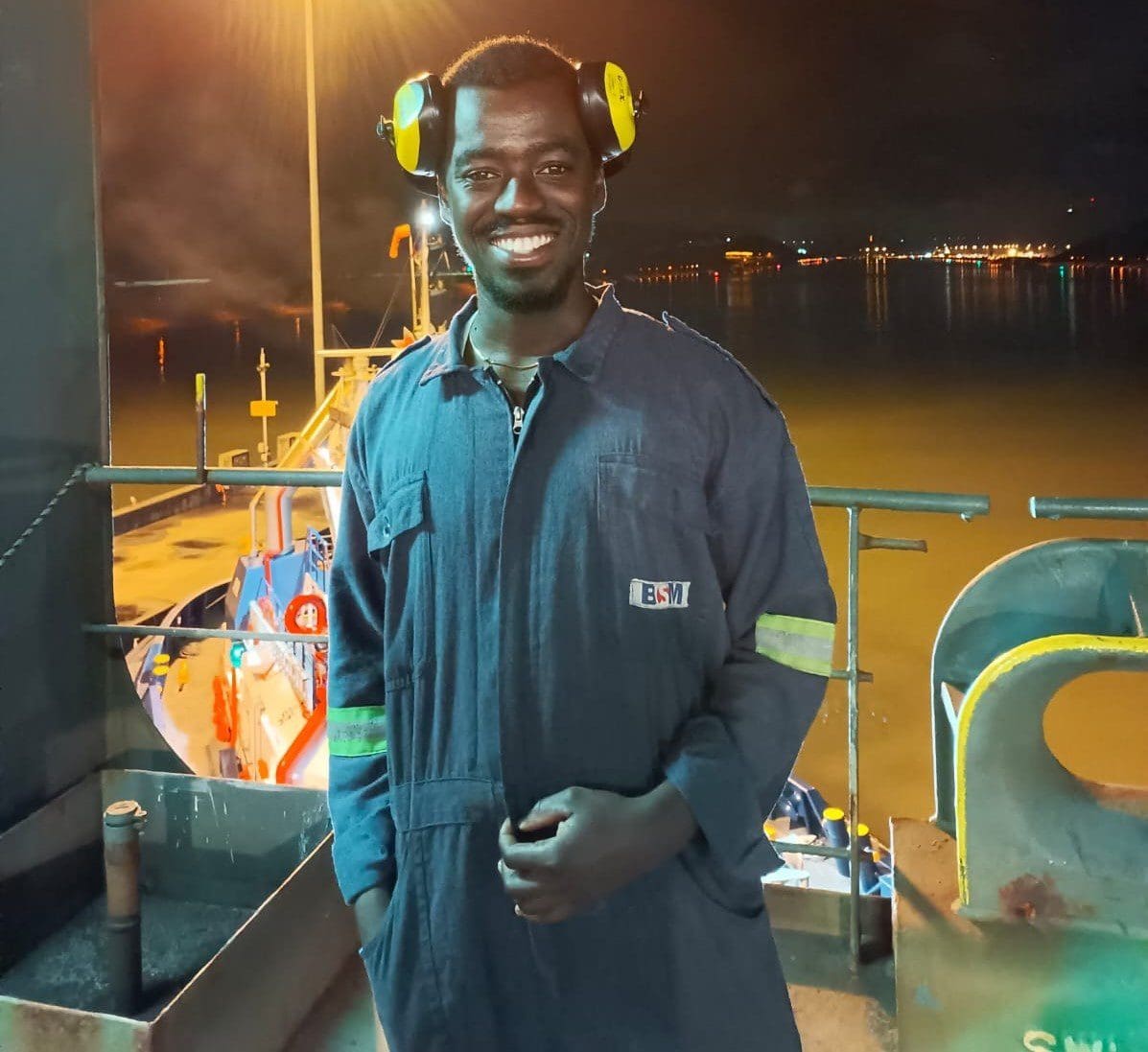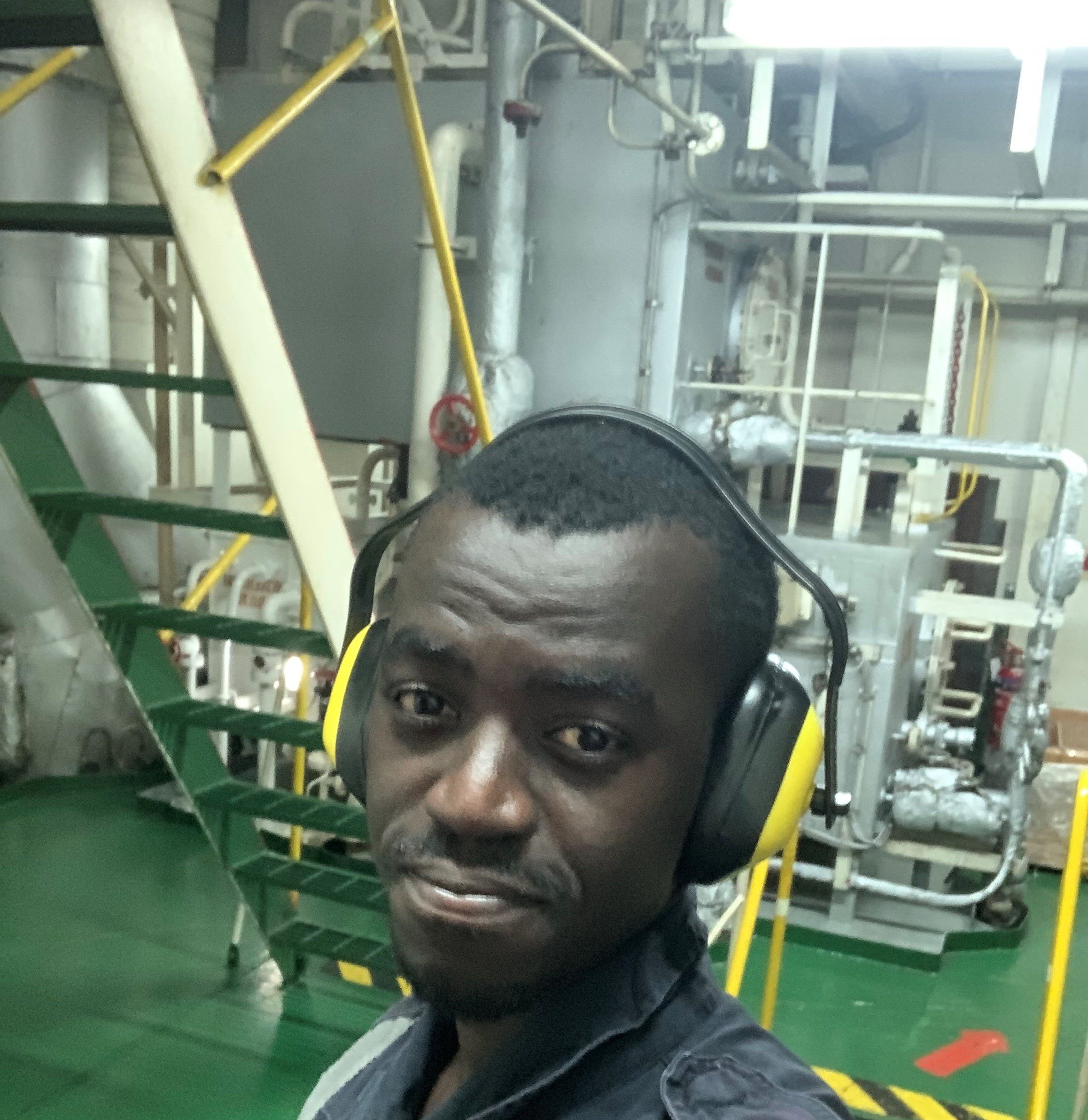Reasons to study marine engineering now
What are the reasons to study marine engineering and what is it like to work on a ship as a marine engineer? This article features a recent graduate marine engineer, Kwadwo Marfo, who shares his experience and advice.
Kwadwo has a degree in Naval Architecture and Marine Engineering from the Regional Maritime University in Ghana.


A Marine Engineer in Ghana – Kwadwo Marfo
Background and path to the study of marine engineering
Could you give a brief description of your background and what led to your interest in engineering?
I have had an interest in the engineering field since my early days in high school. In addition, I always wanted to do something with the practical forms of science. I believe scientific principles and concepts should be shown and used practically.
In high school, where I was President of the science club, I saw to it that we developed a project committee where we welcomed ideas and concepts from students who were interested, and we built a whole lot of projects.
Were you interested in science and how things work when you were a child?
I took a keen interest in science and maths from when I started school. These were my favourite subjects in school. This, I believe, influenced my decision to study general science in high school. I would spend hours reading about topics that many thought were beyond my grade. That is how my interest kept developing.
Was there anyone in your family who guided you towards engineering?
Not actually, as I am the first engineer in my family. Nonetheless, my family supported me in my quest to pursue engineering. Other than that, I had to figure my way around things on my own.
Inspirations to study and work as a marine engineer
Has there been a particular person who has inspired you at school or university?
Yes, and here are just a few.
Alex Burgerson, Chief Engineer,
Alock Kwadwo Asamoah, Engineer,
and Dr Denis Atehnjia, Provost of Regional Maritime University.
Who do you think is the best engineer who has ever lived?
This is a really hard question to answer because a lot of engineers have contributed enormously to the field of engineering. However, from my personal point of view, I would nominate Nikola Tesla as the best to have ever lived.


Naval Architecture and Marine Engineering
Why did you choose Naval Architecture and Marine Engineering?
Naval architecture and marine engineering make one of the many branches of engineering. Many engineers arguably say it is the mother of all engineering as it combines a lot of technicalities from many engineering fields. It has to do with the design, construction, operation, and maintenance of a vessel and its systems. I loved the adventure and challenges and the knowledge and experience that came with it. I am just glad I took my chances there.
Marine Engineer onboard ship
Can you explain exactly what the engineering team onboard a ship is responsible for?
The marine engineering team onboard ship sees to the safe daily operation/running of the main propulsion system/power plant, auxiliary systems and all other ancillary systems and equipment in the engine room (machinery spaces). As well they are responsible for the maintenance and repair onboard where possible, and by extension, bridge and deck equipment in general. The team also offer technical advice to shore based personnel like the technical superintendents with regards to scheduling any major technical maintenance or repair work.
What sort of equipment are you maintaining?
A long list of different equipment. These include:
electric motors,
different kinds of pumps,
purifiers,
turbochargers,
diesel engines,
boilers,
different types of compressors,
sewage plant,
steering system,
and others.
What type of engineering do you do on the ship?
Ship operation engineering comprises a lot, from the main propulsion to steering.
We apply a number of engineering sciences from mechanical engineering, electrical/electronics engineering and computer science.


New skills after the study of marine engineering
How do you obtain new skills while you are working?
New skills may be learnt in various ways. Experience is a major advantage in this industry.
You may learn from:
senior engineers,
training videos/manuals,
and from periodic training meetings.
This is important because one must be up to the task and responsible at every rank one occupies.
Which people do you learn from?
Onboard the ship you learn from everyone. From the chief engineer to the lowest rank.
People have diverse experience on many different types of ships with systems that you may not be privy to yet. As a young engineer, it is therefore imperative for me to ask a lot of questions where I lack understanding, and to be more curious. It is for the safety of everyone on the ship.
What do you do when faced with a difficult technical problem?
The first thing to do is to consult the relevant manual for the equipment. The last thing you ever want to do is to cause a technical disaster!
In the manual, you will have all the maintenance procedures.
Also, manufacturers send service letters to the ship about specific technical issues that may not be in the manual. So, you can refer to these service letters too.
Typical day
What’s your typical day like?
My typical day on the ship at sea (sailing time) begins early in the morning about 0630hrs.
I go down to the control room, and call and inform the navigation officer on the bridge that I am in the engine room. Then, I check:
the load on the running generator(s),
that the emergency generator is on auto start,
that one generator is on standby,
and take a general look at all the running machinery on the main switchboard.
All of these are safety checks.
Then, I take a look through the alarms panel on the main engine control console to see what kind of alarms came up overnight. This gives a fair idea if something went wrong or all is well.
In addition, I check the remote parameters of the main and auxiliary engines, boiler water level and other relevant systems parameters.
Next, I take a thorough look around in the engine room (machinery spaces) while I take soundings of all tanks in the engine room. (sounding is the depth of a liquid in a tank). These tanks include lubricating oil sump tanks, cylinder oil tanks, bilge tanks, freshwater tanks, sludge tanks, oil storage tanks, cooling drain water tanks, greywater tanks and others. Check bilges are clear of oil. These sounding values are calculated according to the trim of the vessel and entered in a record book.
After these recordings, l inform the bridge of my exit from the engine room, then I go for my breakfast.
Toolbox meeting
At 0800hrs, the whole of the engine team is down in the engine control room for a safety meeting, commonly known as the toolbox meeting. At this meeting, we discuss the job to be done for the day, the safety issues involved and how to go about it.
Morning work
At 1000hrs, we have a 30minutes coffee break and so at 1030hrs we go back to our duties.
At noon, I take readings for the engine noon log report and fill up the engine logbook.
1200hrs is lunch.
Afternoon work
1300hrs, work resumes.
1500hrs-1530hrs, I have a 30-minute break.
Then I go back to work till 1700hrs. At this time, we wrap up every job we are doing, take a thorough check that everything is in order in the engine room, then we can put the engine room on UMS mode (unmanned machinery spaces).
Evening checks
At 2000hrs, I come down to the engine control room, and make the same checks as I made in the morning. Then I go for safety rounds in the engine room while noting down necessary engine and systems parameters. After that, I complete the engine logbook for night time too.
At this time, the engine room alarm system will be selected to the cabin of the duty engineer for the day. This will be around 2200hrs.
Working pattern
Do you work on a shift basis?
Onboard the ship, we work on what is known as the watch system. The watch system is a “round the clock” monitoring of the engine system by a responsible engineer or a team of people who make up the watch. During this time their physical presence may or may not be needed in the machinery spaces. Everyone has their watch schedule.
However, onboard ships with UMS systems, everyone may come to work together and only the personnel on duty will attend to any alarms that may come up overnight provided it is not an emergency. In the case of an emergency, everyone needs to come down.
It all depends on the work structure onboard and as per the directives of the Chief Engineer.
Free time on board ship and further study as a marine engineer
What do you do when you are not working?
During my free time, I go to the gym. I also have computer-based training programmes that I take onboard. In addition, I use this time to read some manuals, watch a movie or go to the recreation room and chat with some of the crew. As well, I may go online and have some time with my family and friends.
Protective clothing
What sort of protective clothing do you need to wear as an engineer on a ship?
You always need to be in your boiler suit, safety boots, helmet, hand gloves and ear protectors.
Additional protective gear to be worn depends on where you are going or the kind of job you are doing and the hazards these jobs pose to you.
Most challenging part of the job when at sea
What do you find most challenging when you are working – technical side, other people, or logistics?
Technical
Technically, when there is a fault, and you don’t have enough spare parts. You will have to improvise to contain the problem until you reach a port of convenience where your spare parts are delivered.
Personal
Being at the same location for a long time also drains you psychologically. The ship is a whole new space with different people, different cultures, you cannot have your favourite meal like you can back at home.
The worst part of it is having to deal with people who are racist. One always needs to adjust and adapt to the new environment.
Other times, you cannot have proper sleep due to bad weather.
Poor internet facilities and the long distance from family also contribute to the list of challenges.
What has been your most challenging task so far?
On a MAN B&W 10K98MC-C7 engine, we were doing a unit overhaul at port in New York then we had a series of problems in fixing back a new piston. The ship was scheduled to depart next day in the morning. We had a long working day to get the engine back in order to work, all of this lasted 26 hours without a break.


Is your role ever uncomfortable because of heat, cramped spaces, bad lighting etc?
In modern ships, manning is to the safest minimum. There are not many people on the ships, so everyone has their own cabin where they can rest and also stow their personal belongings. There is a good air handling system for good ventilation. It is more or less a mini suite at sea.
Living at sea
What is more difficult when at sea compared to on land?
Top on my list is bad weather.
Then, the longer you stay, the more likely you are to start being homesick.
The sea is not the natural habitat for humans. You need to psyche yourself to stay at sea.
How do you cope with the lack of space and privacy when you are at sea?
Like I said, we always adjust. I think everyone has their privacy because you have your own cabin to yourself, and you keep your own keys to the cabin. The space may not be as much as you may want, but at least you can make do with it.
Advice for new engineers considering working on a ship after the study of marine engineering
What advice would you give to new marine engineers:
In their first week?
Familiarise yourself properly. Get to know your ship. Familiarise yourself with emergency escape routes, piping systems, transfer system (fuel oil and bilges), take inventory of your assigned machinery and cross check figures in the handing over note from the engineer you relieved.
In their first month?
At the end of your first month, you should know your way around the engine room, and have built enough confidence without complacency to handle certain tasks with or without supervision.
In their first year?
At the end of a year, you should have acquainted yourself so well with your ship that you have become a good resource for the crew. (even though according to MLC 2006, one cannot be on the ship continually for the period of 12 months).
At all times and levels, never stop learning because the ship is too big for you to know everything. There is always something new to learn.
Communication skills
How important are people and communication skills?
We all depend on each other. No single person can run the ship. We always work as a team.
Communication is a very important skill in the industry to the extent that, when you are told something or given an order, you must repeat what you are told so that the one telling you is sure that you really heard and understood what you are being told. Miscommunication can cause many disasters. There are a lot of records of maritime accidents due to poor communication.
Conclusion
I wish to use this opportunity to say thank you to The Field Engineer for the opportunity accorded me to share my bit of shipboard engineering with all the wonderful readers out there. I want to inspire as many young people as possible to focus on building and achieving their potential.
Kwadwo Marfo, Marine Engineer


Further reading about the work and study of marine engineering
Life of a woman marine engine cadet
Marine Electronics Offshore Technical Service Engineer


Responses